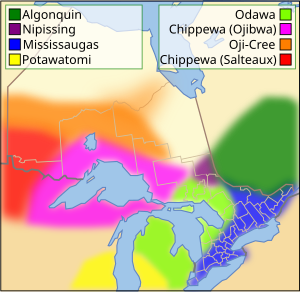Anishnabe

Homelands of Anishinaabe and Anishinini, ca. 1800
|
|
| Regions with significant populations | |
|---|---|
|
Canada (Quebec, Ontario, Manitoba) United States (Kansas, Michigan, Minnesota, North Dakota, Oklahoma, and Wisconsin) |
|
| Languages | |
| English, Odawa, Ojibwe, Potawatomi, and Algonquin | |
| Religion | |
| Midewiwin, Catholicism, Methodism, and others | |
| Related ethnic groups | |
| Odawa, Ojibwe, Potawatomi, Oji-Cree, and Algonquin peoples |
Anishinaabe (or Anishinabe, plural: Anishinaabeg) is the autonym for a group of culturally related indigenous peoples of Canada and the United States that include the Odawa, Ojibwe, Potawatomi, Oji-Cree, Mississaugas, and Algonquin peoples. The Anishinaabeg speak Anishinaabemowin, or Anishinaabe languages that belong to the Algonquian language family. They traditionally have lived in the Northeast Woodlands and Subarctic.
The word Anishinaabeg translates to "people from whence lowered." Another definition refers to "the good humans," meaning those who are on the right road or path given to them by the Creator Gichi-Manidoo, or Great Spirit. The Ojibwe historian, linguist, and author Basil Johnston wrote that its literal translation is "Beings Made Out of Nothing" or "Spontaneous Beings," since the Anishinaabeg were created by divine breath.
Anishinaabe is often mistakenly considered a synonym of Ojibwe; however, it refers to a much larger group of tribes.
Anishinaabe has many different spellings. Different spelling systems may indicate vowel length or spell certain consonants differently (Anishinabe, Anicinape); meanwhile, variants ending in -eg/ek (Anishinaabeg, Anishinabek) come from an Algonquian plural, while those ending in an -e come from an Algonquian singular.
...
Wikipedia
